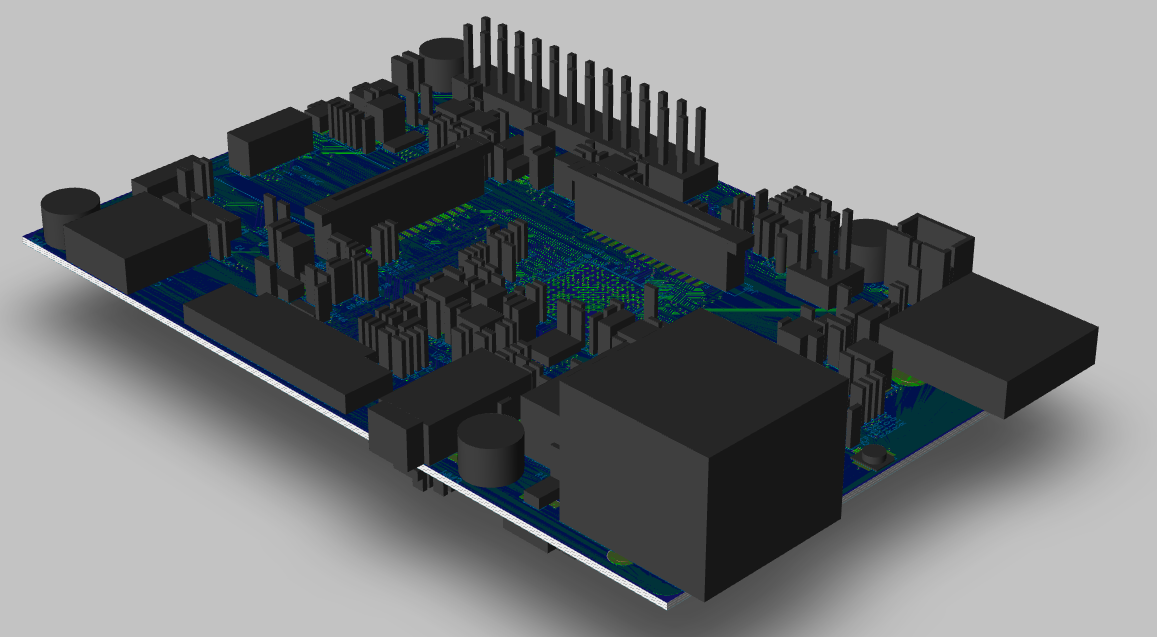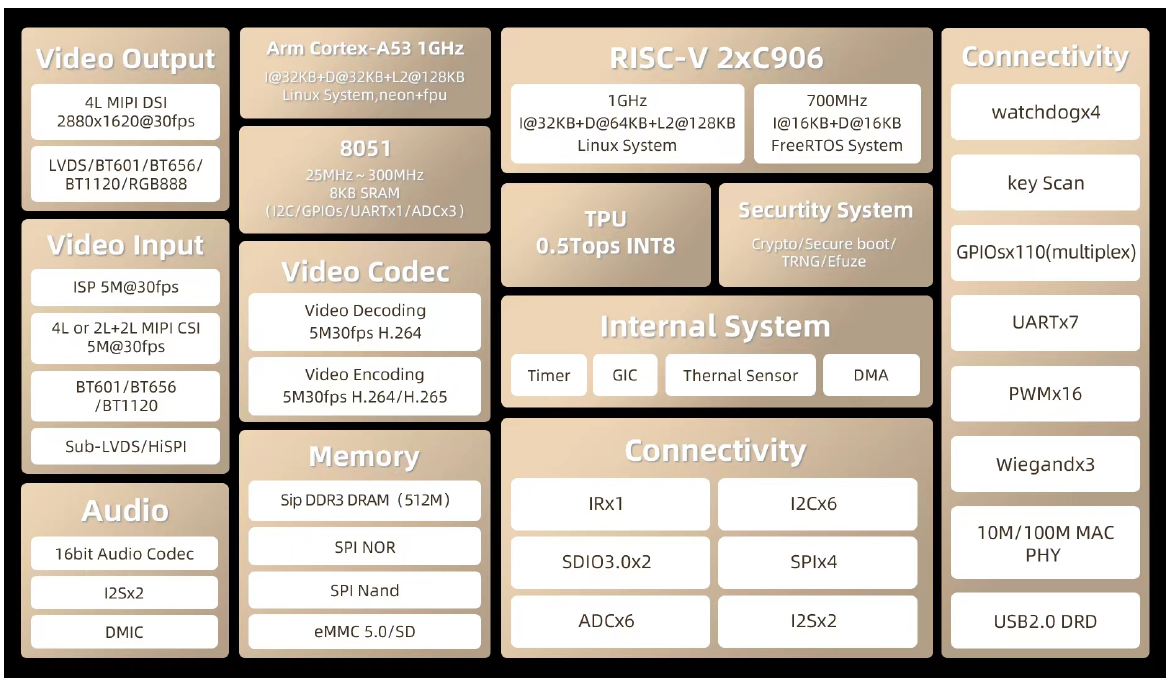Difference between revisions of "Oz64"
| Line 129: | Line 129: | ||
Power Regulator information: | Power Regulator information: | ||
* [https://files.pine64.org/doc/datasheet/ | * [https://files.pine64.org/doc/datasheet/oz64/ETA3414_V1.6.pdf Empower ETA3414 1.5A 3MHz Step_down Converter Datasheet] | ||
* [https://files.pine64.org/doc/datasheet/oz64/ETA3418_V1.4.pdf Empower ETA3418 2.5A 3MHz Step_down Converter Datasheet] | |||
* [https://files.pine64.org/doc/datasheet/oz64/ETA5050_V2.4.pdf Empower ETA5050 500mA Low Noise, High PSRR, Fast Transient Response LDO Datasheet] | |||
MicroSD socket information: | MicroSD socket information: | ||
* [https://files.pine64.org/doc/datasheet/ox64/TF%20PUSH%20type%20socket%20specification.pdf Push type microSD socket specification] | * [https://files.pine64.org/doc/datasheet/ox64/TF%20PUSH%20type%20socket%20specification.pdf Push type microSD socket specification] | ||
== Resources and Articles == | == Resources and Articles == | ||
Revision as of 03:29, 19 June 2024
The Ox64 is a RISC-V based single-board computer based on the Bouffalo Lab BL808 RISC-V SoC with C906 64-bit and E907/E902 32-bit CPU cores supported by 64 MB of embedded PSRAM memory, and with built-in WiFi, Bluetooh and Zigbee radio interfaces. The Ox64 comes in a breadboard-friendly form-factor, has a microSD card slot, a USB 2.0 Type-C port, and many other peripheral interfaces for makers to integrate with sensors and other devices.
Software Releases
Quick Links to the Source of OS Images Build
There is a community effort to bring updated kernels, peripherals and buildroot - Lots of communication happening in the #oz64-nutcracker channel.
- Nuttx Released Image by Lup Yuen
Toolchain:
- elf_newlib_toolchain/bin/riscv64-unknown-elf-gcc (Xuantie-900 elf newlib gcc Toolchain V2.2.5 B-20220323) 10.2.0
- linux_toolchain/bin/riscv64-unknown-linux-gnu-gcc (Xuantie-900 linux-5.10.4 glibc gcc Toolchain V2.2.4 B-20211227) 10.2.0
- cmake version 3.19.3
Software Development Kits
SoC and Memory Specification
Based on the Sophgo SG-200x
CPU Architecture
T-Head C906 1GHz MHz 64-bit RISC-V CPU:
- Supports RISC-V RV64IMAFCV instruction architecture
- Five-stage single-issue sequentially executed pipeline
- Level-1 instruction and data cache of Harvard architecture, with a size of 32 KB and a cache line of 64KB
- Level-2 128KB cache
- Sv39 memory management unit, realizing the conversion of virtual and real addresses and memory management
- jTLB that supports 128 entries
- Supports AXI 4.0 128-bit master interface
- Supports core local interrupt (CLINT) and platform-level interrupt controller (PLIC)
- With 80 external interrupt sources, 3 bits for configuring interrupt priority
- Supports BHT (8K) and BTB
- Compatible with RISC-V PMP, 8 configurable areas
- Supports hardware performance monitor (HPM) units
- See here
T-Head C906 700Mhz MHz 64-bit RISC-V CPU:
- Supports RISC-V RV64IMAFCV instruction architecture
- Five-stage single-issue sequentially executed pipeline
- Level-1 instruction and data cache of Harvard architecture, with a size of 16 KB and a cache line of 16KB
- Sv39 memory management unit, realizing the conversion of virtual and real addresses and memory management
- jTLB that supports 128 entries
- Supports AXI 4.0 128-bit master interface
- Supports core local interrupt (CLINT) and platform-level interrupt controller (PLIC)
- With 80 external interrupt sources, 3 bits for configuring interrupt priority
- Supports BHT (8K) and BTB
- Compatible with RISC-V PMP, 8 configurable areas
- Supports hardware performance monitor (HPM) units
- See here
ARM Cortex-A53 1GHz 64-bit RISC CPU:
- Quad-core Cortex-A53 up to 1.0GHz CPU
- Full implementation of the ARM architecture v8-A instruction set
- ARM Neon Advanced SIMD (single instruction, multiple data) support for accelerated media and signal processing computation
- ARMv8 Cryptography Extensions
- In-order pipeline with symmetric dual-issue of most instructions
- Unified system L2 128KB cache
- Includes VFP v3 hardware to support single and double-precision operations
- Integrated 32KB L1 instruction cache, 32KB 4-way set associative L1 data cache
- TrustZone technology support
- PD_A53: Cortex-A53 + Neon + FPU + L1 I/D Cache of core 2/3
8051 25-300MHz 8-bit CPU:
- Integrated 8K SRAM
System Memory
- SIP DRAM 512MB
Board Features
Network
- 2.4 GHz 1T1R WiFi6
- Bluetooth 5.2
- 10/100 Mbit/s Ethernet with optional PoE capability
Storage
- On-board eMMC module socket
- MicroSD, supports SDHC and SDXC
Expansion Ports
- USB 2.0 Host port
- 26 GPIO pins, including SPI, I2C and UART functionality
- Dual-lane MiPi CSI port
- Dual-lane MiPi DSI port
Board Information, Schematics and Certifications
Board Dimensions: 85mm x 56mm x 18.8mm, see the model-B board dimension drawing
Input Power: +5V @2A with 3.5mm/1.35mm Type H Barrel type DC connector (@1A will work if there is no heavy load on the USB 2.0 port)
Pre-Production version schematic:
- Oz64 Schematic 20240517 v1.0.0
- Oz64 PCB Component placement(ToP) 20240517 v1.0.0
- Oz64 PCB Component placement(Bottom) 20240517 v1.0.0
Certifications:
- Disclaimer: Please note that PINE64 SBC is not a "final" product and in general certification is not necessary.
- Not yet available
Datasheets for Components and Peripherals
Sophgo SG2000 SoC information:
Wifi/BT information:
Power Regulator information:
- Empower ETA3414 1.5A 3MHz Step_down Converter Datasheet
- Empower ETA3418 2.5A 3MHz Step_down Converter Datasheet
- Empower ETA5050 500mA Low Noise, High PSRR, Fast Transient Response LDO Datasheet
MicroSD socket information:
Resources and Articles
Development Efforts
Build
- Nuttx Build by Lup Yuen




